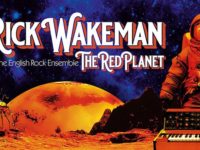Staring into Nothing’s Love is a fresh glance at melodic progressive (and even conceptual!) rock music. But first, a few hors d’oeuvres:
This isn’t about love in general. Rather, it’s the rocky magic between two un-named protagonists in a “cinema show” of their own life together.
Fans of latter-day Andy Latimer-dominated Camel, circa Dust and Dreams, Rajaz, and A Nod and a Wink, will love this record.
The really pleasant vocals steal the initial spotlight (just like the first side Genesis’ The Lamb Lies Down on Broadway), but repeated spins reveal a wondrous waterfall of instrumental prog beauty.
Speaking of Genesis, Love runs a close parallel to a pretty great Tony Banks solo album, as it pops up progressive sounds and adds lovely dramatic psychological rock music insight into the lyrics.
This is music to warmly quell the evolutionary needs of Kurt Vonnegut’s Harmoniums (more about whom later).
The backing female vocals (by, I assume, Savannah Rogers) are sublime.
The many obvious rhymes (and there are many!) on Staring into Nothing’s Love sometimes reduce the importance of the album’s insight into a lifetime of love. But all is forgiven because, let’s face it: The Beatles rhymed “love me do” with “you” and “true.” This record, in its own melodic pop-prog way, circles that nascent McCarthy/Lennon ode to romance.
And, as a prog lover dating all the way back to the Fourth day of Creation, I have never held the convoluted lyrics against wonderful albums like Grobschnitt’s Rockpommel’s Land or Nektar’s Remember the Future. Remember the final line from the before-mentioned Lamb Lies Down on Broadway: “‘Cause it’s only knock and knowall, but I like it…” And I really like this record.
Nathanial Hawthorne wrote in his brilliant Scarlet Letter: “It is a curious subject of observation and inquiry, whether hatred and love be not the same thing at the bottom.” Staring into Nothing has created a soundtrack to the many verities of that very same and very human Love. I think Buddy Holly did the same thing in a song like “Everyday,” because, well, sure, “It’s getting closer, going faster than a roller coaster. Love like yours will surely come my way, a-hey, a-hey-hey.”
Love is just a very melodic prog way of singing, once again, “A-hey, a-hey-hey.” Or, perhaps, “Rikki, don’t lose that number.” That’s always a good thing to do. And, with its classy studio production, and slight jazzy undertones, this album does echo the sound of Steely Dan.
Cut to the chase: The core band — Steve Rogers and Kurt Barabas (with a little help from friends like Trey Gunn and Mike Keneally) – conjures an electric magic. The ending of “Ashes,” with Staring Into Nothing firing on all vocal-piano-guitar-percussion cylinders, is stunning progressive rock music.
That said, my apologies for all those hors d’oeuvres. Now to the grist (and main menu) of Staring into Nothing’s Love.
The first four songs, “Winter,” “Spring,” “Summer” (with horns!) and “Autumn,” work as a suite and a collective metaphor for life and, well, love over many years. But, whereas bass guy Kurt Barabas’ previous band, Under the Sun, was laced with metal moves, this music is laced with Steve Rogers’ fluid piano, percussion, warm guitar, and irresistibly hooked choruses.
There are more clever pop-prog tunes: “The Thin Line” gets all dramatic with a melodic connection between love and hate. “Beautiful Illusion” floats on a cloud of dreams, but then erupts into a melodic frenzy (with more horns!). The Canadian band Klaatu’s brilliant album Hope comes to mind. And there are several snap-shots of really decent Steve Hackett guitar solos to burn. Yeah, that’s pretty nice!
“Only Love” slows the pace, and (perhaps) evokes the ghost of the Beatles as the tune tightropes a balanced McCartney and Lennon pop-song walk. “The Tie That Binds” is, again, pulsing pop-rock music. Then, “Find Our Way Back” ups the pop ante while pleading to “find our way back to the magic,” with a guitar solo (in conjunction with Savannah Rogers’ vocals) that may well heal a deserving undead soul. And for prog lovers everywhere, “To All” gets all Pink Floyd / “Brain Damage” brilliant.
And there is the before-mentioned “Ashes,” with a guitar solo that catches the dramatic flurry of Andy Powell, circa Wishbone Ash’s Argus. It all ends with a very combustible song, “Amazing Grace” — which isn’t the venerable gospel tune, but rather, a dramatic finale that extends the empyrean warmth of Wind and Wuthering’s “Afterglow.” That’s high praise (not to mention yet another Genesis reference!).
And, by the way, those Kurt Vonnegut-created Harmoniums are (according to Alien Species Wiki and A Child’s Cyclopedia of Wonders and Things to Do) “small, apparent semi-sapient organisms indigenous to the caves of Mercury” and “are nourished by vibrations.” They have limited vocabulary that simply says, “Here we are, here we are” and “So glad you are so glad you are.”
Love, with its positive vinyl pulse, would certainly feed those vibration savoy Harmoniums – or for that matter, all other creatures in the universe who simply love a good tune. That said (again!), the great Joseph Campbell (he of The Power of Myth fame) commented: “But marriage is the recognition of a spiritual identity. … By marrying the right person, we reconstruct the image of the incarnate God, and that’s what marriage is.”
Staring into Nothing’s Love, in its own too-many rhymed words, occasional Hallmark commentary, moments of poetic insight here and there, and clever catchy hooks galore, scratches at that very same “power of myth” that examines love — the central theme here — with enough grace, to make progressive rock music, forever and a day, amazing once again.
- Coincidence – ‘Coincidence,’ ‘Clef de Ciel’ + ‘Archives 1973-1974’ (2024) - November 17, 2024
- Mile Marker Zero – ‘Coming of Age’ (2024) - October 14, 2024
- Burton Cummings – ‘A Few Good Moments’ (2024) - October 7, 2024




